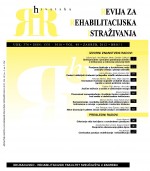
PROCJENA DISLEKSIJE U HRVATSKOME: NEKE ZNAČAJKE ČITANJA I PISANJA ODRASLIH
Assessment of various developmental delays and disorders is a complex process that requires knowledge of normal development, sensibility to recognize and understand deviations as well as to detect one’s fortes. When assessing adults who do not have any prior documentation of their difficulties or their problems have not been correctly identified (often occurring in adults with dyslexia), this process of evaluation is even more complex. Namely, during their upbringing, individuals with dyslexia often tend to develop many compensative mechanisms that complicate identification of basic problems and impairments. Therefore, familiarity with characteristics as well as understanding the idiosyncrasies of adult dyslexic functioning in terms of their accurate description is crucial for a valid assessment. The aim of this paper is to provide a review of the most important characteristics of reading and writing in students with dyslexia, compared to students without that disorder, in order to form the basis for assessment and understanding of dyslexia in terms of specific functioning of individuals who have it (according to the European Dyslexia Association definition; EDA, 2007). This paper is based on a hypothesis that dyslexia is a language disorder, manifesting itself in language-specific errors (made by individuals with dyslexia). Since Croatian can be identified as a ‘transparent’ language, signs of dyslexia can be readily noted in reading and writing. Description of various types and categories of errors will allow for better and more accurate identification of phenomenology of dyslexia in Croatian itself, which can further be beneficial in cross linguistic research. Until now, there have not been any published papers related to the assessment of adults with dyslexia
More...